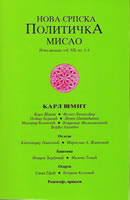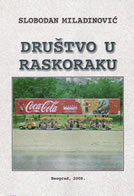| NSPM in English | |||
Extracts from interview Minister Samardzic gave to Reuters |
 |
 |
 |
| петак, 06. јун 2008. | |
|
Samardžić told Reuters that the proclamation of Kosovo's constitution does not mean anything to Serbia , and that it considered it as illegal as the Albanians' first efforts to proclaim a constitution in September 1990 and their unilateral declaration of independence in February 2008. "The date is in line with the transitional 120 days of the Ahtisaari plan, which was never passed in the UN SC and is therefore not legally binding for us. I am not saying that this will not be forced on us, as was the unilateral declaration of independence. But after Sunday comes Monday and the Serbs will continue to live their lives in Kosovo and Serbia will continue its own policy in Kosovo," he said. Samardzic said that Belgrade would implement its policy "in areas where Serbs and non-Serbs loyal to Belgrade live". "Just as UNMIK gradually transferred powers to the PISG, Belgrade took over competences in several areas. It now seems that parallelism is going to continue to exist," he said. "The fact is that these parallel institutions, this functional division, only represent the facts on the ground," he said, as Kosovo Serbs had made it clear that they refuse to live under Albanian rule. Local authorities that were elected in May 2008 by Kosovo Serbs, are democratic representatives of the people there. They are legitimate and loyal to Serbia , and Belgrade will continue to finance their activities. Belgrade has so far been financing education, health and social welfare system since June 1999. ‘This goverenment has also invested significantly in economical development of municipalities with Serbian majority, both as to business development and as to the improvement of infrastructure,' Minister for Kosovo-Metohia said. "In the next week, Serbs in Kosovo will be constituting local assemblies as local institutions of governance, with legally elected representatives. This institutions will be implementing the policy of Belgrade ." UNMIK reconfiguration Samardžić said Serbia categorically opposes deployment of the European Union's EULEX mission, as the purpose of that mission is to consolidate Kosovo's independence, again something outlined in the failed Ahtisaari plan. Instead, Belgrade suggested a partnership pact with the United Nations mission in Kosovo (UNMIK) that would effectively give it rights of governance in Serb areas. ‘This territory is temporarily under the UN mandate, as a UN ward, and to change anzthing, Serbia has to have a say. And the policy of the western countries is that completely opposite, it is one of nobody asking Serbia for much. In this regard, Russia has been really consistent, as is that of China , which is not so vocal, but is equally steadfast. ‘The west counted on Serbia caving in on its principal position, and when it did not happen, we now have a more or less frozen conflict, and this can only be done regularly by negotiations.' ‘Secretary General UN cannot succumb to outside pressure and cannot exert such a huge change of mandate on a UN mission on his own. This can only be done through the SC, and again, this is in line with Article 5 of the R1244 which states this explicitly'. "We have identified the six areas that are key to Serbs' life and their survival in Kosovo: policing, customs, justice, control of the administrative line (between Serbia and Kosovo), transport and telecoms and protection of Serbia 's cultural-spiritual heritage," he said. "Our proposal has been accepted, but then it was modiefied and now it has become part of a package, offered by the U.N. Secretary General on the reconfiguration of UNMIK," Samardzic said. "Let me repeat again, this is not acceptable for us.'' But Serbia was not satisfied, he said. Serbia opposes of any reconfiguration of UNMIK which would not be formulated within the SC UN, as an act, either as a new resolution or as a annex to the existing one. "If the EU were to form a new mission that would be a pillar of UNMIK in Kosovo, as it has had so far in the economic development, we wouldn't have anything against that. But EULEX has only one mandate, to implement the Ahtttisaari plan and that is the independence of Kosovo. We cannot accept such a mission even under the UN umbrella." "We are not ready to discuss any reconfiguration There is too little time to discuss our six points if the deadline is June 15," he said. Serbia 's policy was to negotiate for a solution, but not under artificial pressure. S amardzic said Russia had been a consistent and principled ally so far, and would support anything that Belgrade agreed to. Serbia was counting also on the 150-odd countries that had not recognised Kosovo. "What we have here is a more or less frozen conflict that will last long and can be resolved only with negotiations," he said. Future Negotiations "We cannot change Albanians over night, nor we want to do so. They think they should have independent country of Kosovo," Samaradzic said, "but we have our laws, international as well as domestic laws on Kosovo. Samardzic said that in all throught the initial negotiations on Kosovo's future the Kosovo Albanians were so fixated on independence they turned down anything less, such as Serbia's offer of maximum autonomy. For now, Serbia was seeking an interim solution that would safeguard peace and stability. But in the future, when Albanians grow disillusioned and come to realise that they had achieved very little, Serbia expectes the two sides to sit down and negotiate a permanent settlement. "International financial institutions still do not allow Kosovo to become a member,” Samardzic said, “whereas the solution we had offered would guarantee both peace and autonomy, which would be better than the quasi independence they have now." Future Policy Samardzic declined to speculate if Serbia's policy on Kosovo would remain unchanged under a firmly pro-EU government, but said that although the "EU is very important, EU integrations are very important for Serbia , Serbia cannot sacrifice Kosovo for the sake of EU membership. ‘We have to be able to trust our partner. If Kosovo is taken from Serbia than the deal-breaker is not Serbia , but the EU, trumping on the agreement but also on its own rules and European principles. Entering into close relations with the EU at the moment when 20 member states have recognized the unilateral declaration of Kosovo's independence – I can only interpret this a indirect recognition of Kosovo', Samardzic concluded.
|
Од истог аутора
Остали чланци у рубрици
- Playing With Fire in Ukraine
- Kosovo as a res extra commercium and the alchemy of colonization
- The Balkans XX years after NATO aggression: the case of the Republic of Srpska – past, present and future
- Из архиве - Remarks Before the Foreign Affairs Committee of the European Parliament
- Dysfunction in the Balkans - Can the Post-Yugoslav Settlement Survive?
- Serbia’s latest would-be savior is a modernizer, a strongman - or both
- Why the Ukraine Crisis Is the West’s Fault
- The Ghosts of World War I Circle over Ukraine
- Nato's action plan in Ukraine is right out of Dr Strangelove
- Why Yanukovych Said No to Europe

.jpg)








 Belgrade, June 6, 2008 – Minister for Kosovo-Metohia Slobodan Saramrd žić spoke to the Thomson Reuters news agency today. ? he topics were current situation in Kosovo, the EULEX mission and reconfiguration of the UNMIK, the UN role, the constitution of Serbian local bodies in Kosovo and Belgrade's position on negotiations about final status of Kosovo.
Belgrade, June 6, 2008 – Minister for Kosovo-Metohia Slobodan Saramrd žić spoke to the Thomson Reuters news agency today. ? he topics were current situation in Kosovo, the EULEX mission and reconfiguration of the UNMIK, the UN role, the constitution of Serbian local bodies in Kosovo and Belgrade's position on negotiations about final status of Kosovo. 












